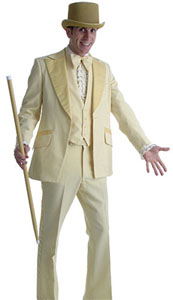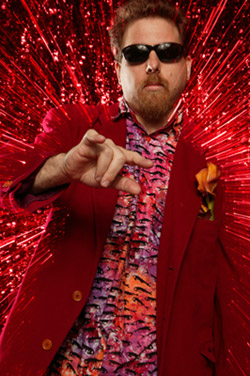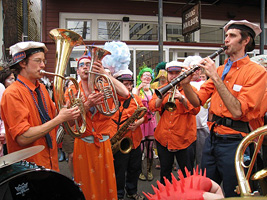Mind the Gap: April 2008 Archives
Many of us have had the experience of going to a conference at which you end up in a cramped, fluorescently lit room for a panel discussion. And just when the introductions are finally over, the audience all caught up on the issues to be discussed, and everyone is finally positioned to dig into the topic at hand...um, time's up, thank you all for coming.
This is how I felt after reading the highly publicized "Music Copyright in the Digital Age" position paper recently released by ASCAP. (You can get your own free copy here. It's all legal, no worries.) To be clear, I'm no "trash copyright; information wants to be free" naïf, but the paper underlined for me once again how seriously far behind the technology we trail as an industry in terms of legal and economic development. The paper's position--after 21 pages of material--was a whopping:
Amid the many "shades of grey" of the copyright debates, it is important to remember that some issues remain black and white... Discussions about how copyright should adapt and evolve along with our changing society are both important and productive--as long as these essential truths are not overlooked in the process.
Well, huzzah! Let's have a good talk. And then maybe a good cry. I don't mean to pick on ASCAP--it's an issue that goes far beyond a single organization, and ASCAP actually won a major online performance issue in court today--but this paper was nowhere near the public leap forward I was hoping for. Where are the new practical and clearly defined rules for licensing creative work in digital formats? There aren't even any preferred proposals for such a scheme that would benefit music creators on view here. Perhaps that was just not within the purview of this paper. And admittedly, many cooks in the kitchen and a roster of unknown unknowns have made it paralyzingly difficult--the proverbial herding of feral cats and four large elephants. Yet, in an addenda to the position paper, we read:
While copyright law can be difficult to understand, its complexity does not render it invalid. "Simpler" does not equal "better"--particularly when it comes to protecting long established rights that make creative professions viable in a financially driven culture.
I'm not a lawyer, just a professional working in the field, but I don't buy that. I think complexity is a big stumbling block in getting artists paid. If it was easier, couldn't we be paying them by now? Is this waiting helping the situation? Can technology, if not the law, help us make it easier? Also, I am unconvinced that if it was easier to pay for the online usage of music, most people would avoid doing so. We could fill up gallon jugs of water at the local public fountain, but we don't. In my experience, the true problem outside of the notorious pot-smoking, dorm-room downloaders (see how dangerous a stereotype can be?) is that your average person can't figure out what's legal or who to pay (let alone negotiate the "how much") without hiring a legal team and a couple of research assistants--not something available to the average non-profit performing ensemble that just wants to make a YouTube video to promote its shows. New amateur broadcasters using Live365 pay their dues every day because it's a package deal. Just print, sign, and send, and you are good to go. The machine makes sure what you are doing is legal. But if you're building podcasts in the basement or adding content to your digital player, the technology lets you do a lot with a few mouse clicks. But following the rules and paying the artists? Well, remember the last time you called the IRS with a question? Just multiply.
Alongside my ASCAP reading, I was working my way through another hot document on the issue--Gerd Leonhard's Music 2.0. (Download a copy here.) In 200+ pages largely culled from his blog postings, Leonhard outlines a "music like water" profit scheme that would turn music access into a service that "feels like free" rather than focus on collecting a fee for copies. (Technological developments being basically the equivalent of one huge Xerox machine, that counter is spun out and broken.) But was his proposed alternative reality too good to be true? If he had the answers, why wasn't anyone doing anything like this? I got to ask him these questions and more in an interview a few days later. You can eavesdrop on our conversation here.
The very next day, as these things seem to go in internet land, the topic was everywhere I looked and the options and arguments multiplied. What if the major labels end up holding the reigns, or what if Apple does? If you're hooked, dig in. More it to be found on Slate and Hypebot.
Feeling left in the dust by internet development? Here's the CliffsNotes course. (Note the heroic inspirational background music, not that you could miss it. Don't you feel more optimistic about the future already?) Sometimes I wonder if we've put too many eggs in the technology basket for no good reason other than that we're attracted to the shiny new toy. But then I see how people half my age are using the platforms, and I realize that I'm the one overly fascinated with the delivery method. I suspect that the new phone ringing (record player playing, radio crackling, car transporting) was also once this much fun.
[via MediaFuturist]
If I haven't been to hear the local symphony in a while, I sometimes forget about this.

In the 21st century, the tuxedo is still generally the costume of the classical musician. I don't mean to beat on this fashion choice--though in most cases I'm not sure how much of a choice it really is--but seriously, Patrick Dempsey and George Clooney aside, who really carries this look with conviction these days?
But it's an iconic trope, with as much expressive weight in a music performance as flannel or safety pins, and so maybe the field shouldn't be quick to shirk it in those attempts to "attract a broader audience" that we hear so much about at conferences. After all, Esquire designed a nine-page layout around capturing classical music mojo as seen draped in Armani and such. Why ditch the branding?
The general argument against such formal wear, of course, is that it gives off the wrong vibe. It's not like being suited up for a shift at Mickey D's, but it can look as uncomfortable and as insincere. Also, it's hard to cry, "No, no, you're wrong! Orchestra performances are not formal, elitist affairs!" while wearing a cummerbund. But as John Stewart pointed out recently in reference to Barack Obama's struggle with a (loosely related) issue, "Doesn't elite mean good?"
When you're dealing with a crew of 70-some musicians, the options are limited. Any kind of continuity in dress is going to get you some sort of stock feel, which conflicts with the whole "creative performing artist" side of the equation. But for better and worse, classical = formal wear, there's just no point in running from that. I mean, would you want to see the tuxes traded for the bolder images of, say, punk? Minding the gap doesn't mean tripping into the ditch, just sayin', and I'd hate to see the dry cleaning bill on that $4,000 suit.
Dear kindly readers of this blog: Often I wonder what the hell people are thinking, and now that I have been empowered with my own personal "publish" button, I am going to start asking them directly and sharing the results with you. If there is anyone you'd particularly like to see grilled here, please drop me a line!
 Steve, you wrote the title song for Morgan Spurlock's latest film Where in the World Is Osama Bin Laden? It's not every day that a composer gets to participate so directly in the war on terror--even in America. How was your tour of duty?
Steve, you wrote the title song for Morgan Spurlock's latest film Where in the World Is Osama Bin Laden? It's not every day that a composer gets to participate so directly in the war on terror--even in America. How was your tour of duty?It was rough, but someone had to do it. Truth is, I was actually never asked to write a theme song. I was enlisted to write the incidental music. The plan was to use an army or orchestral musicians, 50 pieces or more. As I was putting together military strategy for that campaign, this little ditty shot into my head. So I went into the trenches with my FOLKFOOT comrades and recorded it. Sadly, the orchestral soundtrack did not make it, but the song survived. Gee, all this military terminology is kind of freaking me out!
For this engagement, what was your compositional strategy?
This song was for the hearts & minds. I wrote it on the subway. I suppose it is an homage to Woody Guthrie. A call for people around the world to once again hear Freedom's call! Don't let the media keep you from taking a stand.
Do you feel you accomplished your mission?
Creation is the mission. A musician can never fully gage the success for failure of a project they are involved in. I feel pretty good about it. I think it is a catchy tune.
When you're not fighting (at least musically) the Axis of Evil, I hear you're helping Westley storm the castle. After working on the video game adaptation of the film The Princess Bride, what would you say is good about video game composing these days?
I love writing for games, it is an interactive process. I also love writing for animation, I think I have a knack for it. I love comic books & old cartoons, I love being part of a "new" medium that is constantly making up new rules and exploring new frontiers. But you know what the Best thing about game composition is these days? It's the fact that I have been doing it long enough now (15 years) that I get to work with old friends a lot & they are constantly introducing me to new friends. "It's the people, stupid" (me stupid, not you).
Can you even watch movies and TV without obsessing over the soundtrack? I would think Lost would drive a composer in your line a little nuts.
I am lost all the time. The good thing is that I was a consumer long before I was a creator. I have no trouble suspending my musical dis-belief. It is really easy to forget the bad stuff, but when you hear the real deal...it sticks with you!
Spring has sprung and just like an ice cream truck theme song, there are some great new bits of songsmithing that have captured my imagination.

First off, I have Andrew Bird's new Armchair Apocrypha (listen to the complete disc here) running on repeat most nights. As we have seen of late, there are plenty of rockers dipping into the chamber sound and some fantastic string players playing with and within the genre. But perhaps because I was once a rather serious violinist myself, I can be pretty harsh in my personal assessments of these projects. Appreciate yes, but praise--um, not so much. Bird has always stood way out in front of the crowd in this area for me, exhibiting a deep mastery yet measured control of his instrument's capabilities and working intriguing ideas into the texture of the music he creates without letting any sound in too far center stage. Mixed with lyrics that can still surprise your ear even after quite a few passes and the whistling--oh, the most excellent whistling--it's a dreamy package. If you like what you hear, do dig backwards into his catalog to sample some rawer yet delicious tracks.

Also on the spring fantasy playlist are all that bands I discovered while editing an article about music in New Orleans by Aurora Nealand. Seriously, the woman should get a cut from the NOLA tourism association. The best part of working on this piece was getting to the middle of the article before realizing that all of the many projects mentioned up to that point played outside. In the street. Parades! My northern city girl blindness had me laughing out loud, and 15 minutes and some concentrated Googling had me clicking through tons of new music. Come on, would you have been able to resist tracking down a band with a name like Why Are We Building Such a Big Ship? That's got to be a hindrance when it comes to snagging marquee space, I would assume, but I like their moxie.
'Tis the season, I guess, for spring sprucing and the gathering of new music to fill the newly reclaimed clean spaces. Now that it's warm enough to leave the windows open at night, I wonder what the neighbors are into...
Wow. Is this thing on? Okay, thanks. This is sort of awkward. Um, hi, I'm Molly. For the last 10 minutes, I admit I've been making notes for one of those introductory blog posts filled with a lot of biography and a detailed explanation of what I hope to do in this space. But then I read it back and wondered who the hell would care. So--delete--let's jump right in, shall we?
In part that makes it easier, because I'm not really sure what the conversation in this space will become. They let me drive over at NewMusicBox.org on Fridays and I've done some extreme blogging for ArtsJournal in the past, but I've never been a regular. Then a funny thing happened during a panel discussion over at Peabody a few weeks ago: Someone asked me where new music was going and for the first time since I started covering the field in 2001, I realized a big change that I had personally witnessed had finally come to pass.
Picture it: The year is 1999. Where I am living in Brooklyn, many bands are rehearsing in cheap studio spaces. Many of them come from indie rock backgrounds and liberal arts educations, but they are seeking to put their own experimental twist on the genre.
Meanwhile...
Across the river and quite a few blocks uptown--or okay, fine, just as likely right next door--other musicians in other studios are finishing up pieces for their composition degrees at the city's prestigious conservatories. They've got a piece scored for Pierrot ensemble, but they are seeking to put their own experimental twist on the genre.
Sadly, except for the occasional happy anomaly, in 1999 Camp A and Camp B seemed to exist in largely separate worlds, sharing neither common dive bars nor common practices. And this always seemed a shame, because to me it felt like each side had information the other side needed and wanted. I'm not speaking in terms of music (though some wanted to travel that way, too) but more in terms of trading recording technique for orchestration technique.
But that was then. These days when I look out, it's striking to see how close these two camps have come, and it looks and sounds great. This is where my friend Corey Dargel comes in to clarify my thinking and sew it up in a neat package: Molly, he says, it's syncretism.
Yeah, exactly. So I Googled it.
Syncretism consists of the attempt to reconcile disparate or contradictory beliefs, often while melding practices of various schools of thought. The term may refer to attempts to merge and analogize several originally discrete traditions, especially in the theology and mythology of religion, and thus assert an underlying unity allowing for an inclusive approach to other faiths.
Read on for yourself.
That's when I really started to think about what separated what I was hearing now from the cross-over-gone-wrong projects I'd heard before, and when it seemed like there was something deeper to talk about here. What can we learn about performance practice, technology usage, and how to pay the bills from our colleagues in other studios that will help us in our own work? And what bandwagons should we question before jumping on? (Which is to say, I have no MySpace friends and I'm totally okay with that.)
So thanks for stopping by. I hope we'll generate some entertaining coffee talk. Please introduce yourself as we go along.
